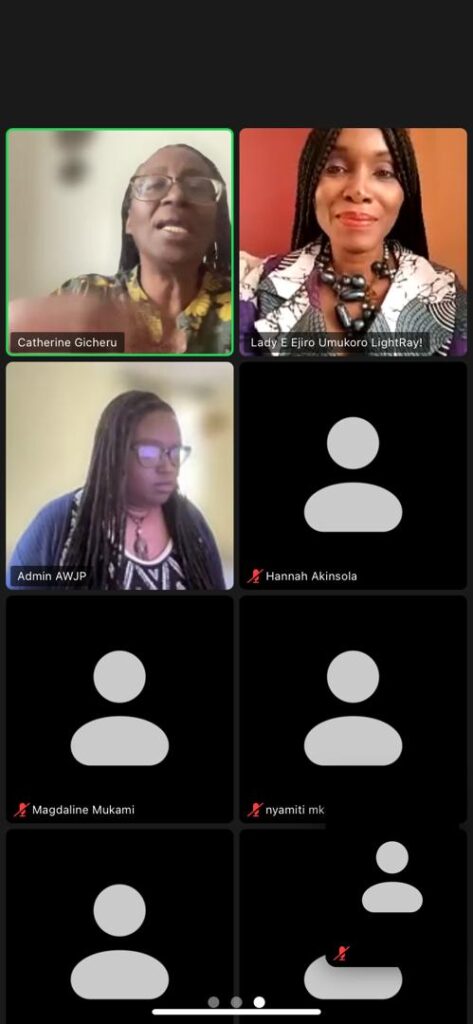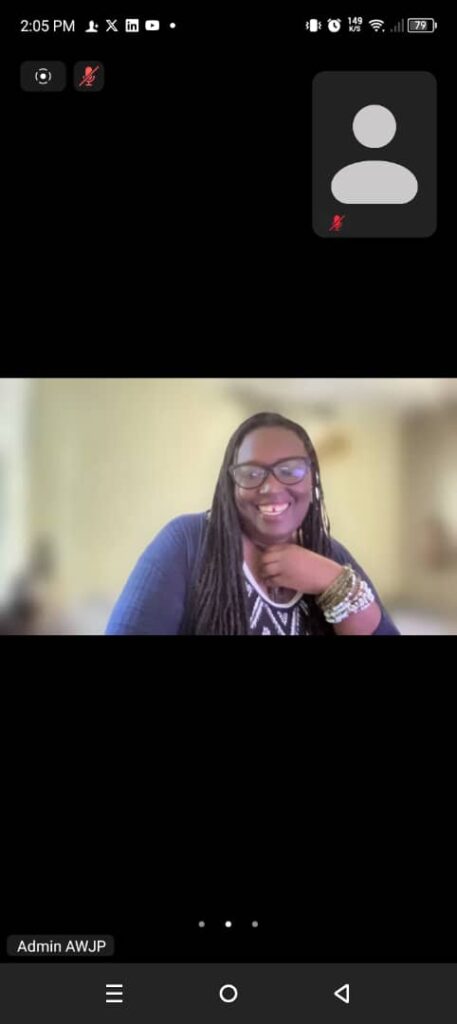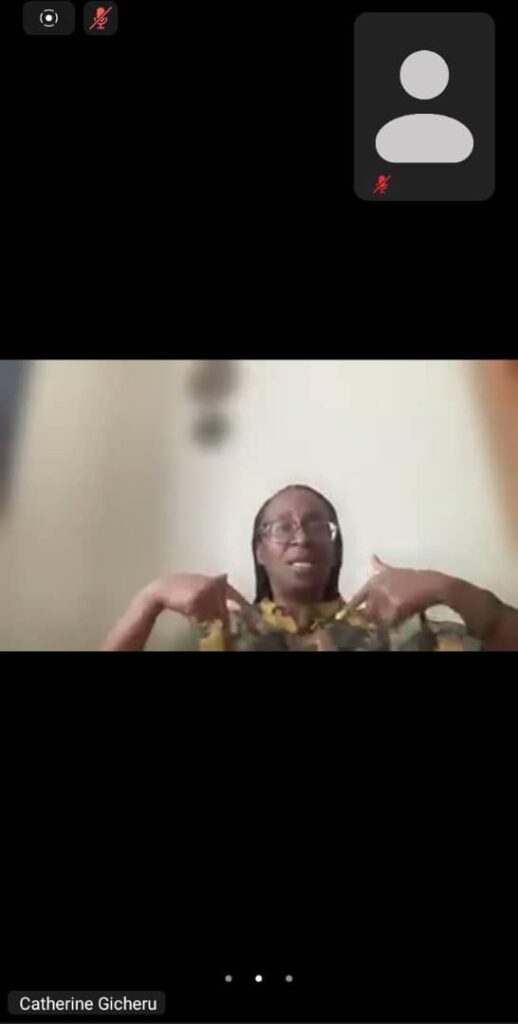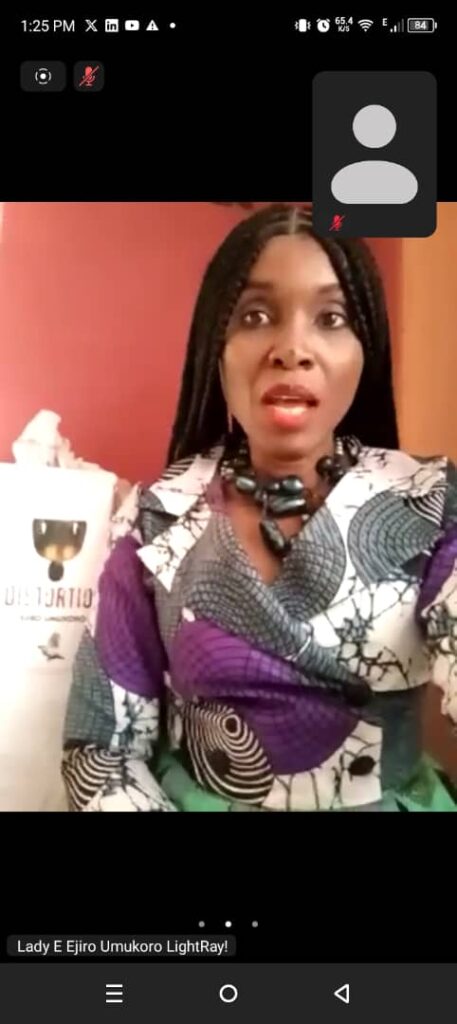Empowering Female Journalists: Mastering Collaborative Investigative Storytelling with Multi Award Winner, Lady Ejiro Umukoro
. . . Rethinking investigative journalism for a new generation of female journalists where passion is converted to passive and residual incomes
By Jimoh Elizabeth Oluwaseyi
As the new year unfolds, it brings with it a wave of fresh hopes, aspirations, and the need for innovative strategies to seize emerging opportunities. In this spirit, the African Women in Journalism Project (AWJP), in collaboration with the International Centre for Journalism Foundation (ICJF) and Light Ray Media, hosted an enlightening networking session aimed at empowering female journalists to leverage investigative stories into creative writing, generating passive and residual income streams across Africa, including both English and Francophone countries, in preparation for the challenges of 2025.
The session was part of a series of programs featuring frontline outstanding women in journalism in Africa by the AWJP led by Catherine Gicheru and Naima Mungai. It was translated into English and French, attracting attendees from Liberia, Nigeria, Kenya, Botswana, South Africa, and other countries.
The session featured the esteemed Nigerian media expert, trainer, author and multi-award winning communications specialist and investigative journalist, Lady Ejiro Umukoro, whose acclaimed investigative book, Distortion, a mental health true crime story has garnered attention for its poignant exploration of domestic violence, child trafficking, human rights abuses and more. With a focus on igniting passion and informed decision-making among female journalists, Lady Ejiro’s insights proved invaluable.

A Journey of Resilience and Advocacy
Lady Ejiro shared her personal journey, emphasizing that her book is not just a narrative about societal issues but a testament to resilience that led to an unexpected outcome turning longform journalism into creative writing generating that generated passive income through creative skills. “My investigative work exposes two types of Yahoo boys: the internet scammers and the Yahoo plus boys, who resort to ritual killings for protection,” she explained, shedding light on the darker facets of society that many prefer to overlook. “Parts of the story that could not be published, where transformed into anonymised true crime story in my book, DISTORTION.”
During her talk, she underscored the importance of safety for female journalists, especially when covering sensitive topics. “Always have police support when interviewing dangerous criminals,” she cautioned. “Your safety is non-negotiable. Prepare yourself physically, psychologically, and mentally.”
Understanding the Criminal Mind
In her book, Lady Ejiro delves deep into the criminal psyche, sharing stories that traditional journalism might not capture. “The long-form storytelling format allowed me to convey elements that print media often misses,” she noted. Her work has resonated widely, even being endorsed as a literature text for students by the Ministry of Education, as it addresses timely issues like female cultism.
She noted that many good stories are forgotten on various platforms, but putting them in books and amplifying them can be powerful, a feat she has achieved.
Focusing on the challenges media and journalism can pose, Lady Ejiro pointed out the barriers women face in investigative journalism, including fear, impostor syndrome, and communication challenges. “Many women struggle to find their voice in the newsroom,” she observed, encouraging them to embrace their identities fully. She emphasised the need for female journalists to watch their nature and words used in their streams of consciousness, nothing that the barriers mentioned can lead to the Pygmalion effect, a self-fulfilling prophesy. She urged women to take charge of their agency and not fall for the typical stereotypes of how women in journalism are perceived wrongly not often disposed to working in collaborative teams.


Building Resilience in Journalism
To foster resilience, Lady Ejiro encouraged female journalists to connect with their authentic selves. “Don’t wear a mask that hides who you are. Embrace your unique qualities and recognize that it’s okay to distance yourself from negative perceptions,” she stated. Emotional intelligence, she added, is crucial in navigating the often brutal landscape of journalism.
She advised female journalists to proactively prepare for investigative work, outlining strategies for seeking support and understanding the dynamics of their stories. “Ask for help when needed,” she urged, emphasizing the importance of community in the field.
Navigating Security and Ethical Dilemmas
The Q&A session brought to the fore critical issues in investigative journalism, including:
- Investigative work lost in translation and the need for creating a glossary of African languages and by extension develop Apps or online glossaries that helps upgrade AI generative content and translation
- Adding value to collaborative storytelling across regions and transnational borders
- Due diligence when selecting team members, factoring in legal considerations and protection
- The importance of trust and having team members who can “have your back”
Catherine Gicheru, following the impact of Lady Ejiro’s journey in transitioning longform investigative journalism to creative writing emphasize the significance of this evolution explaining that “Our journey in journalism should not be confined to reporting and writing, because at the end of our journalistic work, women shall not live by reporting and writing alone!”
In addition to managing personal safety online, Lady Ejiro recommended minimizing personal exposure on social media and seeking assistance from institutions like the International Press Institute (IPI) for added safety when hard-hitting investigative reports are written with a likelihood to go viral or cause discomfort for actors involved in the published story. She also discussed the importance of building rapport with sources, explaining that motivation and ethical treatment are vital in fostering trust.

Repurposing Content for Greater Impact
Lady Ejiro further highlighted the potential for journalists to repurpose their work into various formats. Her book Distortion serves as an example of how investigative stories can evolve into literature, with plans for adaptations into film and stage play. This approach not only diversifies income streams but also broadens audience engagement.
“Investigative journalism can transform into compelling narratives that resonate with diverse audiences,” she said, urging journalists to harness social media to promote their work and create lasting legacies.
A Call to Action
The session concluded with a powerful message for female journalists from Lady Ejiro: “Embrace your gifts and find ways to express them. Build inspiring friendships and enhance your digital skills. Remember, journalism is a remarkable career, but don’t hesitate to take a break or pivot if it’s impacting your mental health.”
As the participants left the session, they were filled with renewed vigor and determination to navigate the challenges of the coming year, motivated by Lady Ejiro’s words of encouragement and wisdom.
The African Women in Journalism Project aims to empower and support African women journalists, promoting gender equality, capacity building, and leadership. By sharing insights and experiences, the project seeks to create a community of resilient and determined female journalists.





Comments